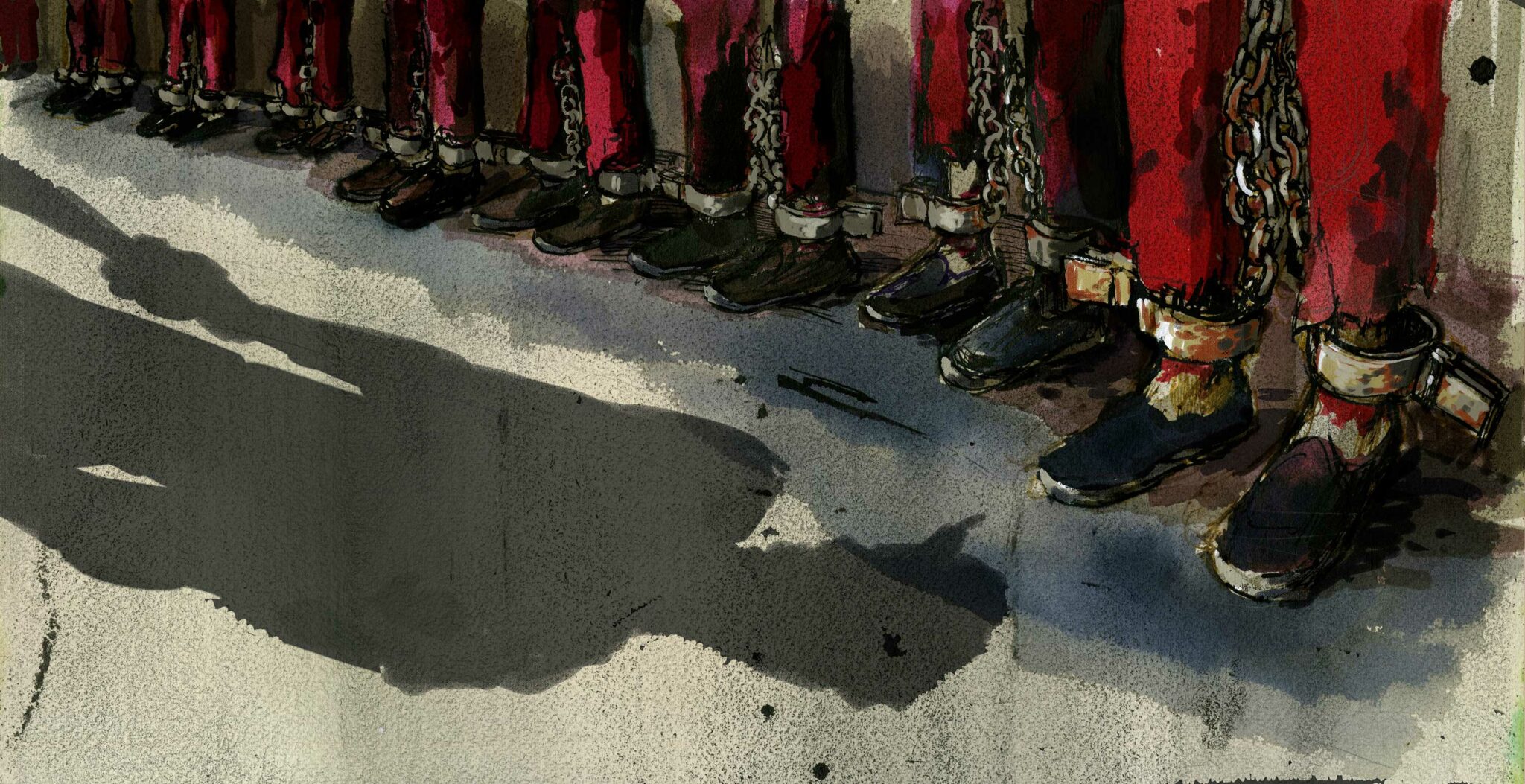Reasons for detention
Some former detainees interviewed were provided with reasons for their detentions at the time they were initially detained; however, many were not given any reason until after arriving at an internment camp, and often not until being forced to “confess” to “crimes” shortly before they were released. [[[Amnesty International interviews.]]] Several were given a reason for their detention when they were detained and then a different reason when they were released. [[[Amnesty International interviews.]]] Some were never given any reason. [[[Amnesty International interviews.]]] “Until today, I don’t know why I was in the camp,” Mansur lamented. [[[Amnesty International interviews.]]]
Former detainees told Amnesty International that the reasons they were given for their detention were often not tied to specific acts; rather, detainees were informed that they had been detained because they had been classified as “suspicious” or “untrustworthy” or as a “terrorist” or an “extremist”. [[[Amnesty International interviews.]]] The precise criteria for such classifications are not known; however, the government of China has used such terms – particularly “terrorist” and “extremist” – in over-broad ways in the context of counter-terrorism legislation. [[[Amnesty International, China: Draconian anti-terror law an assault on human rights, 4 March 2015 →]]]
When specific acts were mentioned, they generally fell into a few broad categories. One category includes offences related to foreign countries. Numerous former detainees were detained for living, travelling, or studying abroad or for communicating with people abroad. [[[Amnesty International interviews.]]] Many were even detained simply for being “connected” with people who lived, travelled, studied, or communicated with people abroad. [[[Amnesty International interviews.]]]
Another category of detainee includes those detained for offences related to using unauthorized software or digital communications technology. Many former detainees were detained for using or having forbidden software applications on their mobile phones, especially WhatsApp. [[[Amnesty International interviews.]]]
Another common category includes anything related to religion. Former detainees were detained for reasons related to Islamic beliefs or practice, including working in a mosque, praying, having a prayer mat, or possessing a picture or a video with a religious theme. [[[Amnesty International interviews.]]]
Other former detainees were detained for having too many children or otherwise violating China’s strict family planning policies. [[[Amnesty International interviews.]]] One former detainee said they had been detained for refusing to work for the government. [[[Amnesty International interviews.]]] Elnara, who while detained helped dozens of other inmates fill in “confession” forms on which they were required to list their “crimes”, said the most common reason she observed was “having multiple household registrations”, which is prohibited under Chinese law. [[[Amnesty International interviews.]]] (For more on confession forms, see Chapter 4.) One former detainee, who was accused of this offence just before her release, told Amnesty she had no idea that having multiple registrations was illegal or that she was still registered at her family’s home where she grew up. She believed the government was simply using this as a pretext to detain whomever it wanted. [[[Amnesty International interviews.]]]
A few former detainees told Amnesty they had been detained after receiving explicit permission to do the very thing they were reportedly detained for. Aibek told Amnesty he was detained for travelling domestically, even though he had obtained prior approval to do so from the appropriate authorities. [[[Amnesty International interviews.]]] Bolat told Amnesty he was detained twice for travelling even though he had received permission from the appropriate authorities both times.
[After I was detained the second time] I asked the village chief [why I was detained]. He said, ‘We are doing what we are told. We don’t know why. All people who are travelling abroad go to the camp. You have no right to ask questions. If you ask why it will be seen as resistance. It will not be good for you. You will get answers in the camp.’ [[[Amnesty International interviews.]]]
The reasons for detention that former detainees provided to Amnesty International are consistent with testimonial and documentary evidence gathered by journalists and other human rights investigators. [[[Foreign Policy, 48 Ways to Get Sent to a Chinese Concentration Camp: Something terrible is happening in Xinjiang, 3 September 2018 →]]] Most significantly, these stated reasons are broadly consistent with the official reasons given in the Karakax list and the Aksu list for detention and internment of individuals. [[[Ariane Zenz, Journal of Political Risk, “The Karakax List: Dissecting the Anatomy of Beijing’s Internment Drive in Xinjiang,” February 2020 →; Human Rights Watch, China: Big Data Program Target’s Xinjiang Muslims – Leaked List of Over 2000 Detainees Demonstrates Automated Repression, 9 December 2020 →]]]
The Aksu list includes government records about more than 2,000 people in that prefecture detained and interned after being flagged by the IJOP. The list reveals that “suspicious” behaviour often leading to arrest and detention included regular religious practice, such as reciting the Qur’an or wearing religious clothing; having more children than permitted by China’s policies; using certain computer software, such as Skype or a VPN; travelling abroad, or travelling domestically without permission; having “extremist thoughts”; being untrustworthy; or being young. [[[Human Rights Watch, China: Big Data Program Target’s Xinjiang Muslims – Leaked List of Over 2000 Detainees Demonstrates Automated Repression, 9 December 2020 →]]]
The Karakax list includes government records for more than 3,000 people. These records include the official reasons why many of these people were detained and interned as well as some of the reasoning behind why certain detainees were released or not released from the camps. The document also reveals significant information about how the government collected detailed information about family members and social networks of detainees. [[[Ivan Watson and Ben Westcott, “Watched, judged, detained: Leaked Chinese government records reveal detailed surveillance reports on Uyghurs families and Beijing’s justification for mass detentions. →; Isobel Yeung and Nicole Bozorgmir, Vice News, “China Targets Muslims for ‘Re-Education’ Camps – and Spies on Their families: The vast majority of people were interned for mundane behavior like wearing a hijab, having “thick beards,” visiting a foreign website or applying for a passport,” 17 February 2020 →; Maya Wang, Human Rights Watch, “More Evidence of China’s Horrific Abuses in Xinjiang,” 20 February 2020 →]]] An analysis of reasons revealed that they fall broadly into eight non-mutually exclusive categories, including untrustworthiness, anything religion-related, and anything linked to locations abroad. The most common reason for detention was violating China’s birth control policies. [[[Ariane Zenz, Journal of Political Risk, “The Karakax List: Dissecting the Anatomy of Beijing’s Internment Drive in Xinjiang,” February 2020 →]]]
According to another internal document leak – the so-called China Cables – hundreds of thousands of individuals have been detained for using certain mobile phone applications. The documents also explicitly instruct authorities to detain Uyghurs who also hold foreign citizenship and to work towards repatriation back to China of those living abroad. [[[“The China Cables”: Bethany Allen-Ebrahimian, International Consortium of Investigative Journalists, “Exposed: China’s Operating Manuals for Mass Internment and Arrest by Algorithm.: A new leak of highly classified Chinese government documents reveals the operations manual for running the mass detention camps in Xinjiang and exposed the mechanism of the region’s system of mass surveillance.” 24 November 2019 →]]] Journalists have reported that government officials were required to fulfil detention quotas and that sometimes people were essentially detained randomly. [[[For reporting on quotas See Human Rights Watch, China: Big Data Program Target’s Xinjiang Muslims – Leaked List of Over 2000 Detainees Demonstrates Automated Repression, 9 December 2020 →; Radio Free Asia, Nearly Half of Uyghurs in Xinjiang’s Hotan Targeted For Re-Education Camps, 9 October 2017 →; Radio Free Asia, Xinjiang Authorities Up Detentions in Uyghur Majority Areas of Ghulja City, 19 March 2018 →]]]
The Xinjiang Victims Database documents the testimonies of former internment camp detainees, their families, and other witnesses. [[[Xinjiang Victims Database →]]] While data collected by the project do not necessarily represent the interned population as a whole, analysis of several thousand testimonies shows that the most commonly stated reasons for detention are related to religion, going abroad, having contact with the outside world, and the behaviour of the detainees’ relatives. Additionally, an analysis of the official reasons for which over 1500 individuals were detained indicates that other common reasons include allegations of “separatism”, violating birth policies, and “extremism”, as well as other vague justifications, such being untrustworthy or disturbing public order. [[[Xinjiang Victims Database →]]]



